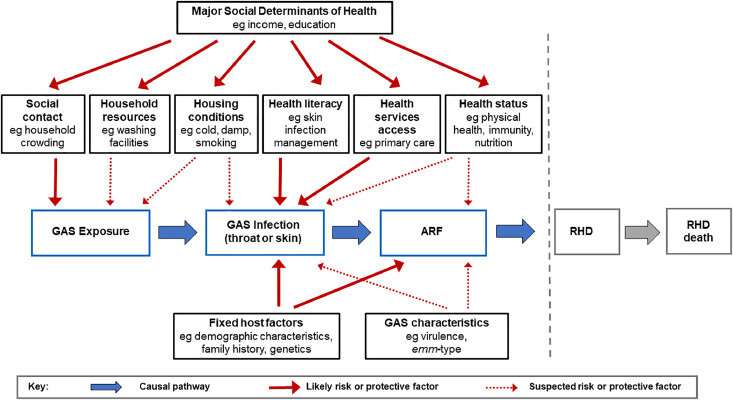Two world-first studies point the way to preventing rheumatic fever in Aotearoa and internationally

University of Otago-led research has uncovered the strongest evidence yet that household overcrowding is a major risk factor for acute rheumatic fever and streptococcal infections of the skin.
Their research is published in two companion articles in the international medical journal The Lancet Regional Health—Western Pacific.
Lead researcher Professor Michael Baker of the University of Otago, Wellington, says it is the first time researchers have investigated risk factors for Group A streptococcal infections of the throat (strep throat) and skin (strep skin) that can cause rheumatic fever.
The studies found that both rheumatic fever and strep skin were linked with barriers to accessing primary health care and a family history of rheumatic fever and rheumatic heart disease, a serious illness which can develop if rheumatic fever is untreated.
Professor Baker says it is a major step forward to have identified a key pathway driving the risk of rheumatic fever.
"Finding a strong association between skin infection and rheumatic fever adds to evidence from other research conducted by our group about the importance of strep skin in triggering this disease. These results suggest that treating skin infections in young children may provide a way of preventing them developing rheumatic fever.
"Our findings reinforce the central role that good quality, uncrowded housing has in protecting children during the period when they are vulnerable to rheumatic fever and other infectious diseases. It is also a reminder of the importance of having good access to primary health care."
One unexpected finding of the rheumatic fever risk factors study was that drinking sugar-sweetened drinks was twice as common amongst the rheumatic fever cases compared with healthy controls, even after adjusting for all the other risk factors.
"There are several ways in which sugar-sweetened drinks could increase your risk of rheumatic fever. We are planning further research to test some of these hypotheses. In the meantime, this is another reason for children to switch to healthy alternatives, such as water or plain milk," Professor Baker says.
Associate Professor Jason Gurney (Ngā Puhi), who had a leading role in the rheumatic fever risk factors study, also emphasized the importance of the research findings.
"Rheumatic fever is an important example of the stark inequities that exist in terms of health outcomes in New Zealand. Rates of rheumatic fever are around 20 times higher for Māori and 44 times higher for Pacific peoples than for non-Māori and non-Pacific peoples.
"It is vital that the new incoming health organizations, notably the Māori Health Authority, Public Health Agency, and Health New Zealand act on these research findings as a high priority. It is also crucial that we look further upstream at the social determinants of this disease and continue to address inequities in access to things like high-quality, healthy housing and primary care."
Dr. Julie Bennett, who took a leading role in the strep infection risk factors study, says the research provides a path forward for Aotearoa New Zealand to apply the broad findings, and to test specific interventions that were highlighted in the research.
"The findings from these two studies and other related research suggest that skin infection is a key target for better treatment. It would be useful to conduct suitable trials to see how better access to effective treatment of skin infections could be delivered most effectively and how this could lower the subsequent risk of rheumatic fever. Any interventions will need to be co-designed with Māori and Pacific peoples."
Professor Jonathan Carapetis, Director of the Telethon Kids Institute in Perth, Western Australia and a Professor at the University of Western Australia, is one of the world's leading researchers on rheumatic fever and other streptococcal diseases. He describes the studies as a breakthrough in the global fight against these diseases.
"This is by far the most rigorous study ever conducted to identify risk factors for rheumatic fever. The study of risk factors for strep skin and throat infections is a world first. Collectively these studies provide a very strong base that can help guide our collaborative goal to eliminate rheumatic heart disease as a global health problem."
Rheumatic fever is an inflammatory reaction to group A Streptococcus bacterial infection of the throat and skin. One or more attacks of rheumatic fever can cause permanent damage to heart valves resulting in rheumatic heart disease which may require major surgery, and can result in a lower quality of life and premature death. The indigenous and Pacific populations of New Zealand and Australia have some of the highest rates of rheumatic heart disease in the world. In 2015, there were an estimated 34 million people living with rheumatic heart disease, with about 233,000 deaths annually.
More information: Michael G. Baker et al, Risk factors for acute rheumatic fever: A case-control study, The Lancet Regional Health—Western Pacific (2022). DOI: 10.1016/j.lanwpc.2022.100508
Julie Bennett et al, Risk factors for group A streptococcal pharyngitis and skin infections: A case control study, The Lancet Regional Health—Western Pacific (2022). DOI: 10.1016/j.lanwpc.2022.100507


















